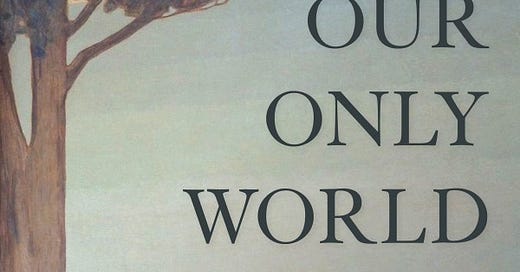Our Only World: On Healing and Wholeness
A little time with Wendell Berry, to better see the ties between repairing both land and human relationships
No doubt this list contains some appreciators of Wendell Berry, the agrarianist and author whose seminal book The Unsettling of America: Culture and Agriculture — if the corresponding titles don’t make it obvious — has had great influence on our work here. What I love about the word ‘unsettling’ is that it signals both the need for decolonization while also recalling Berry’s use of the term to describe the state in which we already exist, our broken relationship with land and place. ‘Unsettling’ manages to evoke the ways in which these two states are inextricably bound up together, two sides of the same coin.
I think the intertwining of those two themes is fairly intuitive for many, but I can sometimes sense the mental leap that people make when I bring the topic of reparations into the same conversation.
As it happens, Berry is a thinker who can also help us bridge this gap. For this I especially recommend The Hidden Wound, as an example of someone wrestling with their family’s own involvement in the ongoing legacy of slavery. In it, Berry digs in to how the way we use other people’s labor can be both cause and symptom of our own broken relationship with land.
The lessons of The Hidden Wound can be summarized rather simply: We aren’t separate from all the beings we rely upon, be it other people or other creatures. And when we treat them as separate, we wound ourselves.
This emphasis on interconnection and wholeness jumped out at me last week while reading another volume of Berry’s that I picked up at the library, his essay collection from 2015, Our Only World. The topics are diverse and yet the worldview he wishes to share and help us forge is singular and clear: to heal we must begin to see ourselves and our world holistically.
Here’s a passage from the opening essay:
We may know the anatomy of the body to the extent of the anatomy of atoms, and yet we love and instruct our children as whole persons. And we accept an obligation to help them to preserve their wholeness, which is to say their health. This is not an obligation that we can safely transfer to the subdivided and anatomizing medical industry, not even for the sake of cures. Cures, to industrial medicine, are marketable products extractable from bodies. To cure in this sense is not to heal. To heal is to make whole, not so ideologically definable or so technologically possible or so handily billable.
This applies as well to industries of landscapes: agriculture, forestry, and mining. Once they have been industrialized, those enterprises no longer recognize landscapes as wholes, let alone as the homes of people and other creatures. They regard landscapes as sources of extractable products. They have “efficiently” shed any other interests or concerns.
We have come to this by way of the disembodiment of thought — a mentalization, almost a puritanization, of thought — depriving us of the physical basis of a sympathy that might join us kindly to landscapes and their creatures, including their human creatures.
Berry goes on to speculate about where this trend in thinking comes from, and how a scientific-industrial culture strangely believing itself to be focused with the material “arrives at a sort of fundamentalist disdain for material reality.” The result: “The living world is then treated as dead matter, the worth of which is determined exclusively by the market.”
The same patterns of thought that treat the living world as dead are what allow us to likewise treat other people as “dead matter,” to be abused or discarded — hence our separation not just from “landscapes and their creatures” but also “their human creatures.”
“To heal is to make whole.” It makes me think of the simple description of reparations that we offered from Marbre Stahly-Butts of Law for Black Lives some time ago: “reparations is a deeper assessment of what harm’s been done and how you can actually make somebody whole.”
But assessing of harming and healing doesn’t come just at the individual level. Healing happens when we realize the search for wholeness doesn’t end at our fingertips, that it expands to our neighbors and even to the very soil upon which we walk. It’s collective, communal.
Later on in Our Only World, Berry says this:
“If we want to save the land, we must save the people who belong to the land. If we want to save the people, we must save the land the people belong to.”
Reconnecting to the land, repairing our relationship there, requires repairing our relationship to people. Repairing our relationship with people cannot be done without attending to our relationship to land. To experience wholeness we must attend to the whole.
People and place and place and people. All of us.
That’s it for this week. As always, thanks for reading Unsettling.
Until next time,
Meg




